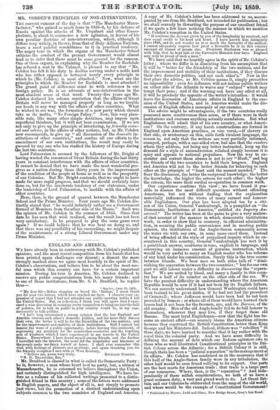MR. COBDEN'S PRINCIPLES OF NON-INTERVENTION.
THE current rumour of the day is that " The Manchester Manu- facturer," who gained so much fame in 1835-6, by his defence of Russia against the attacks of Mr. Urquhart and other Russo- phobists, is about to commence a new agitation, in favour of his own peculiar doctrine of non-intervention, which, although it differs very widely, in theory, from that of Holy-Alliance Toryism, bears a most painful resemblance to it in practical tendency. The angry tone in which the organs of the Manchester School criticize the conduct of the present Government would almost lead us to infer that there must be some ground for the rumour. One of those organs, in explaining why the Member for Rochdale has refused a seat in the Cabinet, is pleased to say that "Mr. Cobden has felt it his duty to decline serving under a noble lord who has either opposed or betrayed nearly every principle to which he (Mr. Cobden) is most attached." Now, what are the principles to which the Member for Rochdale is most attached ? The grand point of difference must be with reference to our foreign policy. He is an advocate of non-intervention in the most absolute sense of that word. Twenty-five years ago Mr. Cobden declared his solemn conviction that the affairs of Great Britain will never be managed properly so long as we trouble our heads in any way with the affairs of other countries. What he wished to see was, the formation of a new party which should take as its motto, "No Foreign Policy." Now, this very plau- sible rule, like many other simple doctrines, may impose upon superficial thinkers, but it will not bear examination. If we are not only to give up the principle of interfering, by friendly coun- sel and advice, in the affairs of other nations, but, as Mr. Cobden now recommends, to give up " all discussion of the domestic in- stitutions of other countries," and confine all our efforts to the amendment of our own institutions, the result may easily be guessed by any one who has studied the history of Europe during the last two centuries.
Lord Palmerston is accused by the followers of Mr. Bright of having wasted the resources of Great Britain during the last thirty years in constant interference with the affairs of other countries. It cannot be denied that we have made the most wonderful pro- gress as a nation during those thirty years in the improvement of the condition of the people at home as well as in the prosperity of our Colonies. But Mr. Bright contends, that we ought to have made far more rapid progress, and that we should certainly have done so, but for the inveterate tendency of our statesmen, under the leadership of Lord Palmerston, to meddle with the affairs of other countries.
Here, then, is the ground of quarrel between the Manchester School and the Prime Minister. Four years ago Mr. Cobden dis- tinctly stated that " he would infinitely rather see a Government formed of Members from the other side of the House." Such was the opinion of Mr. Cobden in the summer of 1855. Since that date he has seen that wish realized, and the result has not been very satisfactory. Is he prepared to play the same game over again ? If we could believe that he was bent on doing so, and that there was any possibility of his succeeding, we might despair of the maintenance of a strong Liberal Government under any Prime Minister.


























 Previous page
Previous page